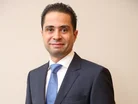COP28 Talks: Microsoft Sustainability chief Sherif Tawfik

The countdown to COP28 is well and truly on.
Arguably the world’s most important gathering on climate change, COP28 is scheduled to take place from 30 November to 12 December 2023 in Dubai, UAE.
As the first country in the Middle East to ratify the Paris Agreement, it is perhaps fitting that COP28 should be held in the UAE.
The wealthy Gulf nation was the first regionally to commit to an economy-wide reduction in emissions, the first to announce a Net Zero by 2050 strategic initiative and was just one of 25 countries in the world to revise its climate targets at Glasgow’s COP26 – raising its 2030 reduction target from 23.5% to 31%.
For Microsoft’s Sherif Tawfik, a resident of the UAE for more than two decades, hosting COP28 in the region and in the Emirates is the perfect choice.
“As the first country in the region to ratify the Paris Agreement, it exemplifies commitment to environmental progress,” Tawfik tells Business Chief.
As Chief Sustainability Commercial Officer of Microsoft, Tawfik oversees the sustainability strategies for more than 100 countries – straddling the Middle East, Africa and Central and Southeast Europe.
“Strategically located between the East and the West, the UAE consistently surpasses expectations, transforming the seemingly improbable into reality,” he says.
“Situated in a region that boasts 50% of the world's leading fossil fuel producers, the UAE also finds itself amidst nations with multi-billion-dollar sovereign funds dedicated to renewable energy and sustainable growth.
The UAE's expertise in seamlessly organising mega-events, such as the EXPO, showcases a harmonious partnership between the private and public sectors.
It is this synergy, according to Tawfik, that makes the UAE an ideal choice for the Global Stock Take COP, bridging the years 2015 and 2030.
He says he hopes to see real action rather than waiting on the promise of a silver bullet solution delivered via new technology or kicking the problem down the road for future generations.
“I'm eager for the digital revolution to pave the way for inclusive sustainability, ensuring technology-driven solutions reach every corner,” says Tawfik.
Tawfik adds that championing local innovators and providing them with the necessary support is crucial, as their tailored solutions will address specific regional challenges. Equally important is the establishment of clear, actionable policies and regulations that guide businesses towards greener futures.
“I cannot stress enough the significance of integrating sustainability skilling, ensuring our next generation is well-equipped to navigate and lead future challenges,” he says.
Middle East challenges – private sector
Aside from talent, what are the other challenges the private sector faces in the region when it comes to sustainability? Tawfiq points to a multitude of interconnected challenges, including data silos and an overwhelming array of sustainability standards that can be bewildering for business leaders.
Additionally, the region's nascent green regulatory landscape sometimes results in inconsistencies that complicate compliance and strategic planning. On a broader scale, businesses face complexities in their supply chains, striving to maintain ethical and sustainable practices amidst geopolitical intricacies.
“A significant impediment is the lack of digital and data maturity among many corporations in the region, making the readiness for sustainable transformation an even steeper challenge,” says Tawfik.
“While there's often vocal acknowledgment from leadership about the importance of sustainability, the practical integration of these values into daily corporate decisions remains inconsistent.
“This is intensified by a prevalent gap in executive education, with many still perceiving sustainability as a mere checkbox rather than an integral component of long-term corporate strategy.”
Here’s hoping that COP28 helps to fill some of those gaps, and provides business leaders in the Middle East with a clear direction and understanding of this most pressing issue.
He says he hopes to see real action rather than waiting on the promise of a silver bullet solution delivered via new technology or kicking the problem down the road for future generations.
“I'm eager for the digital revolution to pave the way for inclusive sustainability, ensuring technology-driven solutions reach every corner,” says Tawfik.
Tawfik adds that championing local innovators and providing them with the necessary support is crucial, as their tailored solutions will address specific regional challenges. Equally important is the establishment of clear, actionable policies and regulations that guide businesses towards greener futures.
“I cannot stress enough the significance of integrating sustainability skilling, ensuring our next generation is well-equipped to navigate and lead future challenges,” he says.
Middle East challenges – private sector
Aside from talent, what are the other challenges the private sector faces in the region when it comes to sustainability? Tawfiq points to a multitude of interconnected challenges, including data silos and an overwhelming array of sustainability standards that can be bewildering for business leaders.
Additionally, the region's nascent green regulatory landscape sometimes results in inconsistencies that complicate compliance and strategic planning. On a broader scale, businesses face complexities in their supply chains, striving to maintain ethical and sustainable practices amidst geopolitical intricacies.
“A significant impediment is the lack of digital and data maturity among many corporations in the region, making the readiness for sustainable transformation an even steeper challenge,” says Tawfik.
“While there's often vocal acknowledgment from leadership about the importance of sustainability, the practical integration of these values into daily corporate decisions remains inconsistent.
“This is intensified by a prevalent gap in executive education, with many still perceiving sustainability as a mere checkbox rather than an integral component of long-term corporate strategy.”
Here’s hoping that COP28 helps to fill some of those gaps, and provides business leaders in the Middle East with a clear direction and understanding of this most pressing issue.
- Why defending nature is vital to Middle East economic growthSustainability
- COP28 Talks: Red Sea Global's Dr Maryam Ali FicocielloSustainability
- COP28 Talks: Rushil Agarwal, Business Lead MENA, AXA ClimateSustainability
- COP28 Talks: Maryam Telmesani, CSO, Modern Building LeadersSustainability
Featured Articles
SAP has announced it has appointed a new President for a newly-created EMEA region, aiming to make the most of the opportunities of cloud and AI
technology
From fighter pilot to fashion house financier, Mohammed Alardhi has taken Investcorp to great heights – so what’s the secret to his success?
Dr Omar Al-Attas, Head of Environmental Protection and Regeneration at Red Sea Global, shares his COP28 hopes and approach to regenerative tourism
strategy

